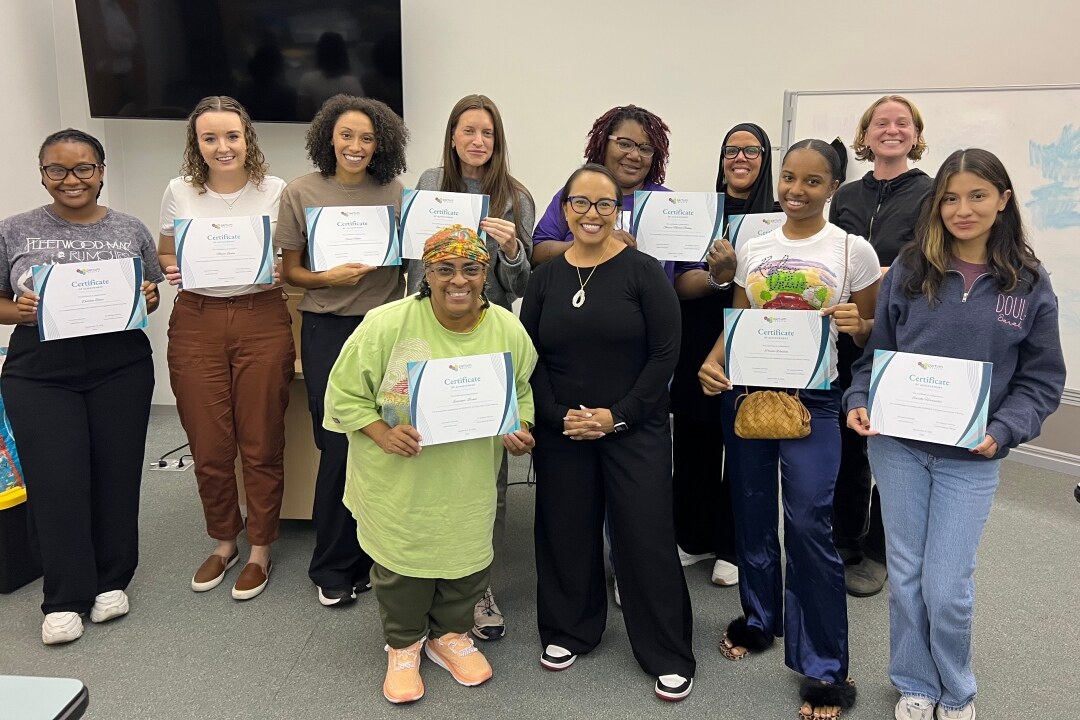What to Say to Someone Who Had a Miscarriage: Therapists Weigh In

This article was clinically reviewed by Dr. Camille Humes, LCPC, LPC, I/ECMH-C, Dr. Brenda Papierniak, PsyD, PMH-C, and Lita Simanis, LCSW, PMH-C
Pregnancy loss is a heartbreak that’s often suffered in silence. If you’re here, you may be grieving a miscarriage yourself or trying to find the right words to support someone who is. Either way, you deserve support and care, and your presence for your loved ones shows deep care and that matters more than you know.
This post will walk gently through the potential emotions surrounding miscarriage and offer guidance from therapists on how to show up with compassion for yourself or for someone you care for.
Grieving a miscarriage: what it can feel like
Everyone grieves differently. Some people are flooded with sadness; others feel numb or angry. For some, the grief may feel complicated or delayed. One person may mourn the future they imagined. Another may struggle with guilt or isolation.
Miscarriage is incredibly common, occurring in about 1 in 4 pregnancies. Because it happens so often, it is often dismissed or minimized. But the pain is real, and deserving of recognition.
After a miscarriage, the emotional landscape can be overwhelming and hard to put into words. Many people feel a deep sense of shock, especially if everything had seemed normal just days or even hours before. The sadness that follows isn’t just about the physical loss, but also the loss of hopes, plans, and the imagined future that was already beginning to take shape. It's common to wrestle with guilt or self-blame, replaying every moment and wondering if something could have been done differently.
Often, there's a profound loneliness that sets in, especially if those around you don’t quite understand the depth of your grief or if they appear to minimize your experience. For those who hope to become pregnant again in the future, that hope may be clouded by fear: fear of another loss, of trusting your body again, or of going through the emotional pain another time.
If you’re grieving a miscarriage, please know: your feelings are valid. You are not alone, and you did nothing wrong.
When clients come to me after a loss I am so careful to remember that their grief process is unlike anyone else's that I've supported in the past. While I lean upon my training and experience, I am dependent upon them to trust me and share their unique story. It is always my intention to honor their grief process while helping them to honor the life that, though ended, still has value.
- Dr. Camille Humes (Clinician, Infant and Early Childhood Mental Health Consultant & Program Strategist
Words of comfort for a miscarriage
You don’t need the perfect words to comfort someone who has experienced a pregnancy loss. You just need to show up with care, compassion, and a willingness to acknowledge the pain. These simple phrases, recommended by therapists and grief counselors, can make a big difference.
“I’m so sorry for your loss.”
This simple sentence is powerful. It acknowledges that something real and painful happened. You’re recognizing that the person has lost more than a pregnancy; they’ve lost a dream, a future, a connection. Even if the pregnancy was early, even if they haven’t shared it widely, this statement affirms the depth of their experience without trying to fix or compare. It lets them know: “I see your pain, and it matters.”
“I’m here if you want to talk, or not talk.”
After a miscarriage, many people feel isolated. Some want to talk about it; others don’t. This phrase gently offers support without pressure. It gives permission to grieve in their own way and in their own time, which is essential for healing. It also signals that your care isn’t conditional on what they’re able or willing to share; you’re there for them either way.
“This must be incredibly hard. I’m thinking of you.”
Grief can feel even heavier when it’s invisible or minimized. Validating how hard this is helps the person feel seen and understood. It also keeps the focus on them, not on your own experiences or assumptions. The phrase “I’m thinking of you” may seem small, but it gently reminds them they are not alone. Even if you’re not physically close, your care and presence are still with them.
“I don’t know exactly what to say, but I care about you.”
You don’t need to have all the right words, and trying to “make it better” can sometimes do more harm than good. Admitting that you don’t know what to say is honest and disarming. It removes pressure and opens space for authentic connection. Pairing it with an expression of care says: “I may not have the answers, but I’m not going anywhere. I care about your heart.”
“Would it be helpful if I brought you a meal or took care of [specific task]?”
In the fog of grief, small acts of service can mean the world. Offering specific, concrete help, like dropping off dinner, walking the dog, or handling school pickup, eases the daily burden when everything feels overwhelming. This approach is often more helpful than saying “Let me know if you need anything,” which puts the responsibility back on the grieving person. Stepping in with care shows love when words may fall short.
Don’t forget to ask the other parent or partner how they are doing and what they might need during this time.
Often the mother is the one most supported and partners are not given the same support or acknowledgment. They too have experienced a loss and while they might not have the physical discomfort their emotional needs are just as important during this time. Fathers/non-birthing parents will often minimize their own experience because they are most concerned about their partner who has experienced the physical loss. Acknowledging both of their loss can help them to open up with each other as well.
What not to say after a miscarriage
Most people who say the wrong thing after a miscarriage aren’t trying to be unkind; they’re trying to ease pain or make sense of something that feels senseless. But some common responses, even when well-intentioned, can feel minimizing, dismissive, or even shaming to someone who is grieving.
Here are a few phrases to avoid, and why they often land the wrong way:
“At least it was early.”
This may be intended to offer comfort by downplaying the loss, but for someone who has already bonded with their baby–even if just for a few weeks–timing doesn’t change the weight of their grief. It can feel like you're saying their pain doesn’t count, when in reality, every loss is personal and may be deeply felt.
“You can always try again.” or “When will you try again?”
While both can be meant to instill hope, these statements can gloss over the pain of this pregnancy ending. It assumes someone is ready (or even wants) to start thinking about the future, when they may still be in shock or mourning. It also reinforces the idea that babies are interchangeable, when for many people, this baby was already loved and imagined as unique.
“Everything happens for a reason.”
This phrase often stems from a desire to find meaning in tragedy, but for the person grieving, it can feel like their pain is being wrapped up in a tidy bow. When someone is in the rawness of loss, they may not be interested in trying to assign reason to it. Sometimes loss is just painful and unfair.
“It’s nature’s way of taking care of a problem.”
While this might be medically accurate in some cases, it’s emotionally tone-deaf. Using clinical or biological language to describe a deeply emotional loss can come across as cold or dehumanizing. A pregnancy, even one that was brief, is often experienced as the beginning of a life and a relationship, not a “problem.”
“I know exactly how you feel.”
Even if you’ve experienced your own loss, it’s best to leave space for the uniqueness of someone else’s grief. Saying you “know exactly” how they feel can unintentionally center your experience rather than theirs. A more compassionate approach might be, “I’ve been through something similar, and I’m here if you ever want to talk about it.”
Instead of offering platitudes, try offering presence. A gentle hand on the shoulder, a short message of love, or a willingness to sit in silence can speak volumes. Miscarriage doesn’t need to be fixed: it needs to be honored. Let your empathy, not your explanations, lead the way.
Miscarriage and Mental Health
Miscarriage doesn’t just affect the body; it can reverberate through every part of your emotional and mental wellbeing. Yet far too often, the psychological impact is overlooked, dismissed, or kept quiet. You might hear, “Miscarriages are so common,” or, “You’ll feel better soon,” and wonder why you still feel stuck, heavy, or different.
The truth is, pregnancy loss can be a traumatic experience for the person experiencing the loss, their partner, and their families. And just because something is common doesn’t mean it’s easy.
After a miscarriage, you might feel like you’re on an emotional rollercoaster: devastated one day, numb the next. You may cry easily, or not at all. Some people feel angry, restless, or deeply anxious. Others feel shame or guilt they can’t explain. These are all normal responses to grief and trauma.
In some cases, miscarriage can trigger or intensify:
- Depression: Feelings of hopelessness, sadness, or loss of interest in daily life
- Anxiety: Worry, panic, or obsessive thoughts about what went wrong or what might happen next
- Sleep disruptions: Trouble falling or staying asleep, or nightmares
- Postpartum depression or anxiety symptoms: Even after early loss, hormonal changes can bring mood swings or physical symptoms often seen in PPD patients
- Post-traumatic stress: Flashbacks, body tension, or a feeling of being “stuck” in the experience
- Other mental health conditions: Any symptoms or distress that impact daily activities.
If you’re experiencing any of these symptoms after a pregnancy, know that you are not broken; you are grieving.
When to reach out for support
It’s okay to need help, and many people find that processing miscarriage with a trained mental health professional allows them to feel more grounded, validated, and hopeful again.
Therapy can be especially helpful if:
- You feel overwhelmed by grief that isn’t easing with time
- You're blaming yourself or struggling with guilt
- You have anxiety about becoming pregnant again
- Your relationship is feeling strained
- You feel emotionally disconnected from your body or from others
Look for a therapist who specializes in perinatal or reproductive mental health. They’ll understand not only the clinical side of loss, but also the emotional complexity that comes with it. Support groups, virtual or in-person, can also help ease isolation and connect you with others who get it. Their credentials will include a Perinatal Mental Health Certification or PMH-C.
You don’t need to wait until you’re “really struggling” to talk to someone. Therapy can be a place to honor your experience, tend to your grief, and uncover a path forward.
Grief has no timeline. You’re allowed to heal slowly, to revisit the pain when it resurfaces, and to ask for help as many times as you need. Taking care of your mental health after miscarriage is not a luxury, but an act of deep self-compassion.
Whether you're grieving a loss or holding space for someone who is, please remember: this kind of heartbreak deserves gentleness. Your grief is real. Your love for your baby is real too.
If you’re supporting someone through miscarriage, don’t underestimate the power of your quiet presence, your listening ear, and your willingness to be there.
You are not alone. And you don’t have to have all the answers to show that you care.
Partum Health team








Related articles

Let us care for you
Treat yourself to a better fertility, pregnancy and postpartum experience.











